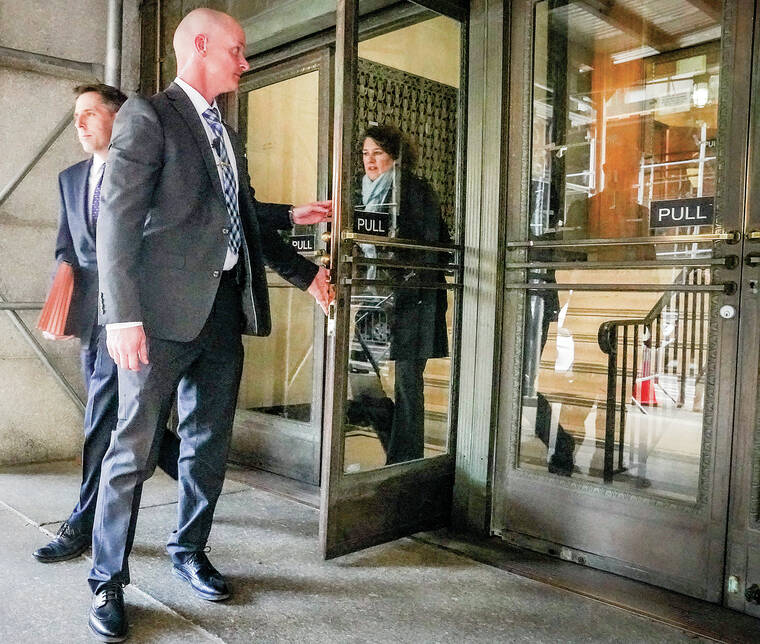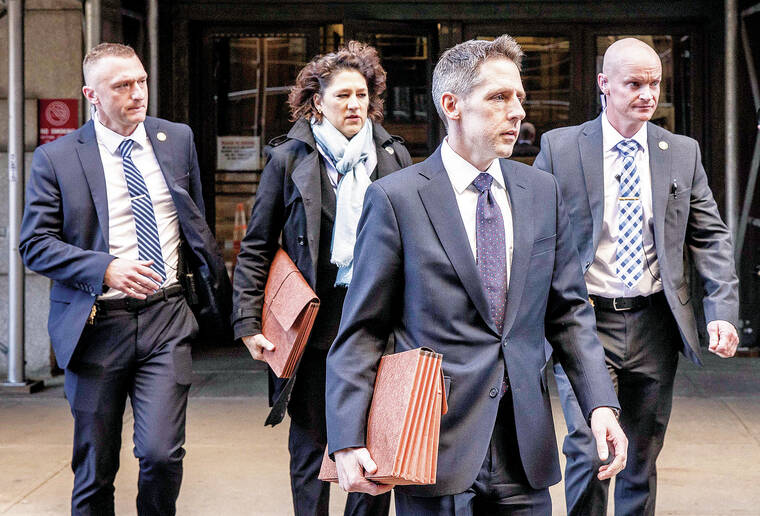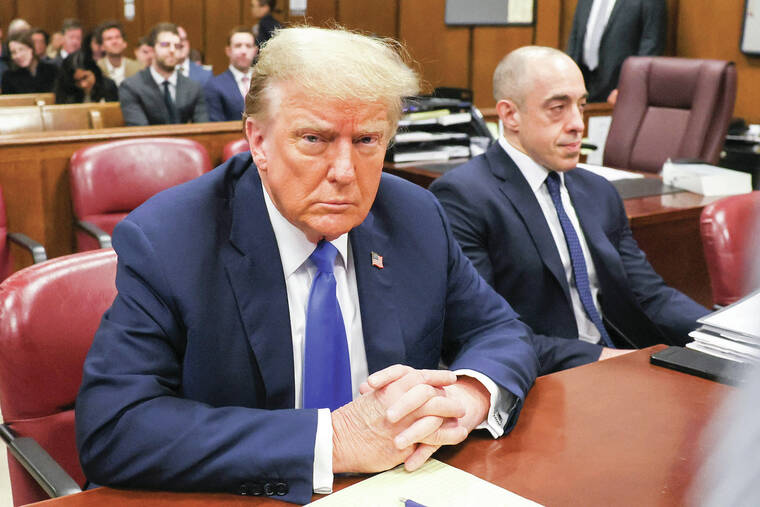An unprecedented trial opens with two visions of Trump
NEW YORK — Manhattan prosecutors delivered a raw recounting of Donald Trump’s seamy past Monday as they debuted their case against him to jurors, the nation and the world, reducing the former president to a co-conspirator in a plot to cover up three sex scandals that threatened his 2016 election win.
Their opening statement was a pivotal moment in the first prosecution of an American president, a sweeping synopsis of the case against Trump, who watched from the defense table, occasionally shaking his head. Moments later, Trump’s lawyer delivered his own opening, beginning with the simple claim that “President Trump is innocent,” then noting that he is once again the presumptive Republican nominee and concluding with an exhortation for jurors to “use your common sense.”
ADVERTISING
The jury of 12 New Yorkers who will weigh Trump’s legal fate before millions of voters decide his political future also heard brief testimony from the prosecution’s leadoff witness, David Pecker, a former tabloid publisher who was close with Trump. Pecker, who ran the National Enquirer, testified that his supermarket tabloids practiced “checkbook journalism.” In this case, prosecutors say, he bought and buried stories that could have imperiled Trump’s 2016 campaign.
The flurry of activity on the landmark trial’s first formal day captivated jurors, many of whom jotted notes as they followed along.
On Monday, the trial ended early and with little fanfare, to accommodate the Passover holiday and a juror’s emergency dental appointment.
But it began in striking fashion, with Judge Juan M. Merchan determining what prosecutors could ask of Trump should he take the witness stand in his own defense. In a victory for the prosecution, the judge ruled that they could question him about three civil trials he lost over the last year — including a fraud case in which a different judge found him liable for conspiring to inflate his net worth, and penalized him hundreds of millions of dollars.
Matthew Colangelo, a senior aide to Manhattan District Attorney Alvin Bragg, then seized on what he called a conspiracy in the criminal case. Over the course of a 45-minute opening, as Bragg watched from the front row, Colangelo calmly walked the jury through the prosecution’s argument that Trump orchestrated the plot to corrupt the 2016 election.
The scheme, he explained, involved hush-money deals with three people who had salacious stories to sell: a porn actor, a Playboy model and a door attendant at one of Trump’s buildings.
Trump, who faces up to four years in prison, directed allies to buy those people’s silence to protect his candidacy, Colangelo explained. Pecker took care of the model and the door attendant, while Michael Cohen, Trump’s former fixer who is set to be the prosecution’s star witness, paid off the porn actor.
After taking the White House, Colangelo added, Trump agreed to “cook the books” to cover up Cohen’s $130,000 payment to the porn actor, Stormy Daniels. When Trump reimbursed Cohen, Colangelo said, Trump and his company falsified internal records, disguising the repayments as routine legal expenses.
Trump faces 34 felony counts of falsifying business records, one for each false check, ledger and invoice.
The former president lied “over and over and over” again, Colangelo emphatically said, casting him as a conniving criminal.
But Trump’s lawyer Todd Blanche sought to undercut the prosecution’s lofty rhetoric with a more innocuous distillation of the case, calling it a “business records violation” that wasn’t.
Instead, he said, it was “just 34 pieces of paper.”
Blanche placed blame on Cohen, who had hashed out the reimbursement plan with Trump’s company and pleaded guilty to federal charges for his role. Blanche contended that “President Trump had nothing to do with the invoice.”
Previewing what is likely to be a recurring motif, Blanche took aim at Cohen’s credibility, noting that he “is a criminal” and arguing that he is a scorned former employee who will stop at nothing to put Trump in prison.
“I submit to you that he cannot be trusted,” Blanche said, adding, “He’s obsessed with President Trump even to this day.”
Colangelo insisted, however, that much of Cohen’s testimony would be corroborated, including by Pecker and “an extensive paper trail.”
In Monday’s opening statement, Colangelo unspooled a scathing account of events surrounding Trump’s insurgent run for the White House.
It began in summer 2015, soon after Trump announced his candidacy, with a meeting among Trump, Pecker and Cohen. They met at the candidate’s midtown Manhattan headquarters, where they hatched what the prosecutor called “the Trump Tower conspiracy.”
The plan was to watch out for any damaging stories about Trump — and then hide them from voters.
Such stories arose swiftly. Soon, Pecker bought the silence of the door attendant, whose story about Trump fathering a child out of wedlock turned out to be false.
Then came the Playboy model, Karen McDougal, who said she had an affair with Trump while he was married. The National Enquirer again stepped in, buying the rights to her story and then never publishing it, a practice known in the tabloid business as “catch and kill.”
The third and most legally problematic deal — the $130,000 payoff to Daniels — took shape in the campaign’s waning weeks.
Daniels threatened to go public with her decade-old story of sex with Trump just as his campaign was reeling from the release of the “Access Hollywood” recording, in which Trump boasts about grabbing women’s genitals.
“The campaign went into immediate damage control mode to blunt the impact of the tape,” Colangelo said, and that included keeping Daniels quiet. “Another story about sexual infidelity, especially with a porn star, on the heels of the ‘Access Hollywood’ tape, could have been devastating to his campaign.”
Once Trump was elected and had to repay Cohen, he and his company falsified the records to cover it up, Colangelo said.
“He wanted to conceal his and others’ criminal conduct,” Colangelo told the jury, arguing that the falsification “shows just how important it was to him to hide the true nature of Cohen’s illegal payment to Ms. Daniels and the overall election conspiracy.”
Blanche, for his part, disputed that any accusations amounted to election interference. “I have a spoiler alert: There’s nothing wrong with trying to influence an election,” he said. “It’s called democracy. They put something sinister on this idea as if it were a crime. You’ll learn it’s not.”




